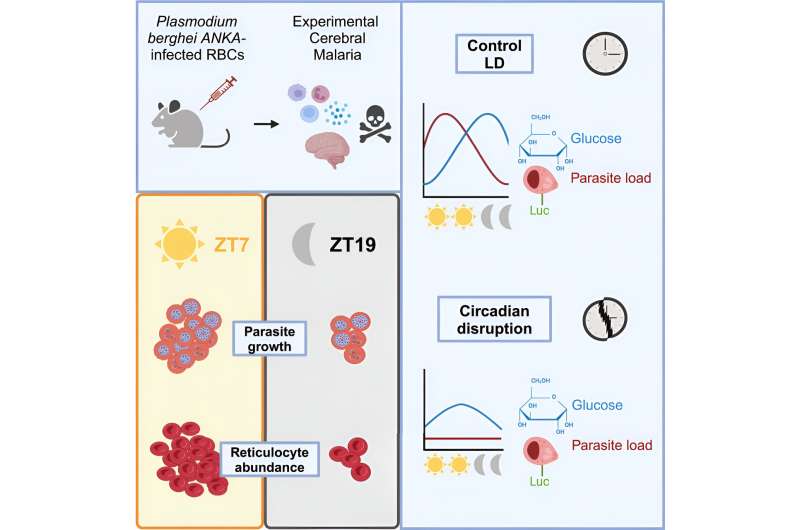This article has been reviewed according to Science X's editorial process and policies. Editors have highlighted the following attributes while ensuring the content's credibility:
fact-checked
peer-reviewed publication
trusted source
proofread
Circadian rhythms appear to influence vulnerability to malaria parasites

A discovery by McGill-affiliated researchers could lead to more effective treatment of malaria and other parasitic diseases.
When mice are infected in the middle of the night with the parasites causing cerebral malaria, the symptoms of the disease are less severe than for those inflected during the day, and the spread of the parasites within the hosts is more limited, research teams from McGill University, the Douglas Research Centre and the Research Institute of the McGill University Health Centre have discovered.
Malaria is a mosquito-borne infectious disease that affects hundreds of millions of people worldwide. It kills more than half a million people each year, most of them children. Cerebral malaria is the deadliest form of the disease.
The researchers' findings have the potential to lead to new treatment practices based on aligning medication with our circadian rhythms. The paper is published in the journal iScience.
How circadian rhythms of host and parasite interact
Circadian rhythms are defined as physiological and behavioral oscillations with cycles of approximately 24 hours, matching the Earth's rotation, that persist in the absence of environmental timing cues. These rhythms are regulated by a master clock in the brain, as well as by clocks located in most other organs and cell types throughout the organism.
"We explored how the circadian rhythms of both the host and the malaria parasite interact to affect the severity of the disease and the host's ability to fight off the parasite," said Priscilla Carvalho Cabral, a recent McGill Ph.D. graduate who carried out the experiments described in two recent studies on the subject.
Nicolas Cermakian, Director of the Laboratory of Molecular Chronobiology, and the corresponding author of the two studies, noted, "The difference in a host's response to infection depending on the time of day suggests that their circadian rhythms could be influencing the progression of the disease. How such immune clocks impact malaria has not been looked at before."
An important advance in knowledge
In parasites and their animal hosts, as well as in most living organisms, many bodily functions are under circadian control. It is known, for instance, that the replication of malaria parasites inside the red blood cells of a host follows a daily rhythm.
Previous work by the same team has already shown that another serious parasitic disease, leishmaniasis, is affected by host clocks: the time of infection influences the replication of the parasite as well as the immune response to it. In the new studies, the same was found to be true for cerebral malaria.
"Our results represent an important advance in knowledge since many of the mechanisms driving the rhythms in susceptibility to diseases, especially parasitic diseases, remain largely unknown," says Martin Olivier, Director of the Laboratory for the Study of Host-Parasite Interaction, a professor in McGill's Department of Microbiology and Immunology and co-author of the two studies.
More information: Priscilla Carvalho Cabral et al, Time of day and circadian disruption influence host response and parasite growth in a mouse model of cerebral malaria, iScience (2024). DOI: 10.1016/j.isci.2024.109684




















